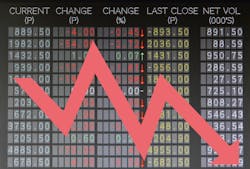SmileDirectClub stock plummets one month after their IPO
SmileDirectClub (SDC) has had a rough couple of months. First, their IPO stumbled on September 12, with stocks losing 28% of value on the first day. Some market analysts become excited when a company they see as a long-term winner offers stocks at a low price, so there was some hype recently that it was a great time to buy SDC shares. But the price continued to fall. As of October 14, the stock price had fallen almost 60% from its IPO, leading one news source to call it, “So what happened?”
One major development occurred on October 13, when California Governor Gavin Newsom signed bill AB1519 into law. This law provides stricter regulations for teledentistry. Dentists who remotely review orthodontic cases being treated in the state of California must now disclose their full names and license numbers, and they must review radiographs prior to treatment. Also, patients may now submit any complaints to the California State Board, regardless of whether they signed a non-discloser agreement (NDA) with the aligner company.
This marks a major change in how direct-to-consumer aligner companies can operate in California. While not all carious lesions, calculus, or signs of periodontal disease can be detected on radiographs, requiring remote dentists to review them will certainly help identify patients who should not undergo orthodontic treatment. At the very least, it should help hold those remote dentists accountable to the California State Board if they are negligent in prescribing orthodontic services for their customers who have active disease.
For customers of direct-to-consumer aligners who have complaints but do not live in California, they can avail themselves of the FDA’s MedWatch program until October 22. Contrary to what the SmileDirectClub’s cofounder and CFO stated on CNBC, the ADA petition to the FDA has not been dismissed. ADA President Chad Gehani, DDS, released a statement on October 9 that corrects SDC’s leadership and summarizes the concerns that the ADA has brought to both the FDA and the FTC.
What will the future hold? Perhaps other states will follow California’s lead in protecting the public from the perils of unsupervised dentistry as it currently operates. Perhaps direct-to-consumer aligner companies will view the California legislation and petitions to the FDA and FTC as a sign that they must find a new operating model. That model should address the concerns that have been raised by the ADA, AAO, and other professional associations. While we wait and see, it is encouraging to know that the market has responded to SDC’s IPO with trepidation.
Cheers,
Chris
About the Author

Chris Salierno, DDS
Chief Editor, Dental Economics
Chris Salierno, DDS, is the chief editor of Dental Economics and the editorial director of the Principles of Practice Management and Group Practice and DSO Digest e-newsletters. He is also a contributing author for DentistryIQ and Perio-Implant Advisory. He lectures and writes about practice management and clinical dentistry. He maintains a blog to answer patient questions at ToothQuest. Dr. Salierno maintains a private general practice in Melville, New York. You may contact him at [email protected].
Updated Dec. 4, 2020
